- Bipolar Disorder
- Therapy Center
- When To See a Therapist
- Types of Therapy
- Best Online Therapy
- Best Couples Therapy
- Best Family Therapy
- Managing Stress
- Sleep and Dreaming
- Understanding Emotions
- Self-Improvement
- Healthy Relationships
- Student Resources
- Personality Types
- Guided Meditations
- Verywell Mind Insights
- 2024 Verywell Mind 25
- Mental Health in the Classroom
- Editorial Process
- Meet Our Review Board
- Crisis Support

7 Ways to Practice Self-Love
Barbara is a writer and speaker who is passionate about mental health, overall wellness, and women's issues.
:max_bytes(150000):strip_icc():format(webp)/Barbara-Field-1000-64786ecaff3a46ce872a8aeb4e217bf6.jpg)
Ivy Kwong, LMFT, is a psychotherapist specializing in relationships, love and intimacy, trauma and codependency, and AAPI mental health.
:max_bytes(150000):strip_icc():format(webp)/Ivy_Kwong_headshot_1000x1000-8cf49972711046e88b9036a56ca494b5.jpg)
Marko Geber / Getty Images
What Is Self-Love?
How to practice self-love.
Having self-love involves having an appreciation and respect for yourself. That includes taking care of your physical and mental health. Although most people are busy, it's important to take time to nourish yourself and treat yourself with the love and kindness you deserve.
Self-love is having regard for our own well-being and contentment according to the American Psychological Association.
While self-care proponents suggest taking baths and getting massages, loving yourself goes much deeper than splurging once in a while on pleasures like these.
Self-love should be a daily activity in which you check in with yourself and treat yourself the way we treat loved ones.
The Brain and Behavior Research Foundation says that self-love comes from actions that support physical, psychological, and spiritual growth.
What Self-Love Is Not
Some critics think self-love is a modern concept and is merely self-indulgence. They view self-love as excessively focusing on yourself and akin to narcissism . But self-love is not about having a grandiose sense of self or being puffed up with self-importance. Self-love means taking care of your needs and recognizing that you have value.
The Importance of Self-Love
Your first relationship is with yourself and it’s the foundation of relationships with others. Loving yourself enables you to live in alignment with your values and to make healthy choices in your everyday decisions. Confidence , self-respect, self-worth, and self-love are all interconnected. As we deepen in love for ourselves, we can deepen the love we share with others.
Sometimes it’s hard to assert yourself and think about your own needs. While it might be considerate to practice self-love here and there, it's important to make it a daily practice .
Here’s how to incorporate self-love into your lifestyle.
Prioritize Your Well-Being and Mental Health
Your physical and mental health are directly correlated and how you feel physically can influence how you feel mentally and emotionally. When you begin loving and caring for your body, you’re directly and positively influencing your mental health, too. Eating and sleeping well is important in maintaining well-being and warding off illness. That means choosing healthy foods and getting adequate sleep every night.
Exercising regularly has a positive impact on your overall health as exercise decreases cortisol, the stress hormone, in your body.
Remember to give yourself time to take care of and value yourself. Struggling with mental health issues might require visiting a therapist, choosing online therapy , or turning to an app .
Embrace Self-Compassion
When you acknowledge your mistakes and accept your imperfections with kindness and without judgment, you exhibit self-compassion . Dr. Kristin Neff’s widely accepted definition of self-compassion has three components:
- Self-kindness : feeling kindness toward ourselves rather than judgment, criticism, or shame
- Common humanity : recognizing we are part of a common humanity as everyone makes mistakes rather than viewing ourselves as isolated beings unworthy of love and belonging
- Mindfulness : viewing mistakes mindfully by having a perspective and not over-identifying with our failings
In a pilot study on self-compassion, scientists empirically tested the use of a writing intervention to determine if these self-compassion components influenced each other. Findings showed that the three components do mutually enhance each other.
Don’t Compare Yourself to Other People
When we are jealous of our friend’s promotion or feel we are lacking because we gained ten pounds while our neighbor is in great shape, it’s hard not to feel down. Social comparisons can cause stress. Comparison and competition may motivate you in ways that are helpful and not harmful. More often than not, they diminish us by causing stress, anxiety, guilt, and shame.
Social media has affected our mental health in not-so-great ways. We judge ourselves more harshly on a regular basis and don't feel good enough. High social media use has been linked to depression.
Set Boundaries
Drawing the line helps with stress management . Sometimes you have to say 'no' at work or to your family to preserve your energy. One-sided relationships have unequal distribution of energy, control, and thoughtfulness. Recognize your needs and carve out time to be thoughtful about yourself by setting boundaries.
Forgive Yourself
Cultivate ways to stop self-loathing in any form. Forgive yourself for your past mistakes and find ways to heal. To incorporate self-love in your daily life, don’t ruminate over mistakes and regrets. Rather than blame yourself for things that were probably out of your control anyway, turn to self-forgiveness.
A recent study finds that greater forgiveness is linked to less stress and a decrease in mental health symptoms.
Surround Yourself With Supportive, Loving people
Having social support is vital. You could reach out to receive your family’s love for you but if those relationships are strained or they’re not in the picture, invest in relationships with your friends and community and allow yourself to receive care and support from them.
Let go of toxic, draining, and one-way friendships. The goal is to fortify yourself with healthy interactions and people who believe in you, champion you, and support you in becoming more of who you are and want to be, not less.
If you think you’re in love but aren’t sure, remember that healthy relationships involve intimacy and deep emotional connection. Invest your time, energy, and care into platonic and romantic relationships that support, energize, and restore you.
Change a Negative Mindset
Positive thinking doesn’t mean ignoring problems. It means choosing to have a positive outlook as an approach to life that includes gratitude and many possibilities. Maybe it’s time to seek support to process your anger and release resentment and grudges , for example.
Holding onto and fixating on anger and hatred towards others can be damaging to our mental and emotional well-being and it can be an act of self-love and care to address it at the root cause.
Say kind things to yourself. Positive affirmations can boost your self-esteem and reduce your social fears. Remind yourself that you’re a kind person doing your best. Changing your perspective and focusing on things that you are grateful for and appreciative of can be immensely uplifting and is another way to practice self-love.
APA Dictionary of Psychology. Self-love .
The Brain and Behavior Research Foundation. Self-love and what it means .
Rudolph DL, McAuley E. Cortisol and affective responses to exercise . J Sports Sci . 1998;16(2):121-128. doi:10.1080/026404198366830
Self-Compassion: Dr. Kristin Neff. Definition of self-compassion .
Dreisoerner A, Junker NM, van Dick R. The relationship among the components of self-compassion: a pilot study using a compassionate writing intervention to enhance self-kindness, common humanity, and mindfulness . J Happiness Stud. 2021;22(1):21-47.
Toussaint LL, Shields GS, Slavich GM. Forgiveness, Stress, and Health: a 5-Week Dynamic Parallel Process Study . Ann Behav Med . 2016;50(5):727-735. doi:10.1007/s12160-016-9796-6
By Barbara Field Barbara is a writer and speaker who is passionate about mental health, overall wellness, and women's issues.

How it works
Transform your enterprise with the scalable mindsets, skills, & behavior change that drive performance.
Explore how BetterUp connects to your core business systems.
We pair AI with the latest in human-centered coaching to drive powerful, lasting learning and behavior change.
Build leaders that accelerate team performance and engagement.
Unlock performance potential at scale with AI-powered curated growth journeys.
Build resilience, well-being and agility to drive performance across your entire enterprise.
Transform your business, starting with your sales leaders.
Unlock business impact from the top with executive coaching.
Foster a culture of inclusion and belonging.
Accelerate the performance and potential of your agencies and employees.
See how innovative organizations use BetterUp to build a thriving workforce.
Discover how BetterUp measurably impacts key business outcomes for organizations like yours.
A demo is the first step to transforming your business. Meet with us to develop a plan for attaining your goals.

- What is coaching?
Learn how 1:1 coaching works, who its for, and if it's right for you.
Accelerate your personal and professional growth with the expert guidance of a BetterUp Coach.
Types of Coaching
Navigate career transitions, accelerate your professional growth, and achieve your career goals with expert coaching.
Enhance your communication skills for better personal and professional relationships, with tailored coaching that focuses on your needs.
Find balance, resilience, and well-being in all areas of your life with holistic coaching designed to empower you.
Discover your perfect match : Take our 5-minute assessment and let us pair you with one of our top Coaches tailored just for you.

Research, expert insights, and resources to develop courageous leaders within your organization.
Best practices, research, and tools to fuel individual and business growth.
View on-demand BetterUp events and learn about upcoming live discussions.
The latest insights and ideas for building a high-performing workplace.
- BetterUp Briefing
The online magazine that helps you understand tomorrow's workforce trends, today.
Innovative research featured in peer-reviewed journals, press, and more.
Founded in 2022 to deepen the understanding of the intersection of well-being, purpose, and performance
We're on a mission to help everyone live with clarity, purpose, and passion.
Join us and create impactful change.
Read the buzz about BetterUp.
Meet the leadership that's passionate about empowering your workforce.

For Business
For Individuals
What self-love truly means and ways to cultivate it

There is a multi- billion dollar industry dedicated to self care — around $450 billion , to be precise. And while self-care practices are an important part of cultivating self-love, it's not everything. To put it another way, while bath bombs and massages are ways of expressing your love for yourself, they’re not necessarily how you build it.
Many of us have been subject to a variety of messages around self-love and how to cultivate it. We may have been told that we “can't expect anyone to love us until we learn to love ourselves.” But for those of us who've experienced childhood trauma , difficult relationships, or any number of other painful experiences, learning to love ourselves may not be as easy as it sounds.
The good news is that self-love is actually a skill you can develop — much like self-confidence or self-trust. And it's an important one. Learn what is means to love yourself, how to go about building self-love, and whether or not you really need the bath bomb in this article.
What does self-love mean?
Self-love means that you have an appreciation, affinity, and positive regard for yourself. It’s closely related to self-esteem and self-compassion. When you have a strong sense of self-love, you understand your own value and treat yourself in a loving way.
Unlike narcissism, which is excessive self-absorption and self-interest, self-love is a positive trait . Loving yourself means having a good understanding of both your strengths and weaknesses. Narcissism is generally associated with poor mental health. But high self-love has a positive effect on your well-being, mental fitness , and your relationships.

Why is self-love important?
Self-love is critical to our overall well-being. And despite what the perfectionists think , loving yourself doesn’t mean that you don’t hold yourself to a high standard. Without feeling positively towards ourselves, we may find it hard to be motivated. Many studies suggest that we need self-love in order to take action, take chances, and take on new opportunities.
The importance of loving yourself
Self-love is important because it motivates much of our positive behavior while reducing harmful behavior. It both empowers us to take risks and to say no to things that don’t work for us. It’s a key component of building self-compassion .
Self-love helps us take care of ourselves, lower stress, and strive for success. But it also protects us from negative thoughts, self-sabotage , and pushing ourselves too far. It’s important to recognize that knowing what to say “no” to is just as important as learning when to say “yes.”
5 benefits of self-love
Self-love isn’t all touchy-feely. Well — okay, it is kinda touchy-feely, but its benefits are rooted in science.
1. Lower stress, higher resilience
When we feel stressed, it’s generally because we don’t feel capable of living up to the challenges in front of us. When you have a strong sense of self-love, you’re better able to tackle challenges. Negative feelings and self-critical thoughts compound stress. When we feel good, though, it’s usually easier for us to problem-solve .
Self-love and self-compassion are directly linked. When we have a high sense of self-love, we’re able to look at challenges as temporary setbacks — or even as opportunities for growth. This attitude helps us become more resilient.
BetterUp’s research has found that coaching can help improve self-compassion by over 60%. And self-compassion has a marked impact on developing resilience.
Not only does self-compassion — and by extension, self-love — help us bounce back better, it keeps us mentally fit. More than 1,000 research studies have linked self-compassion to reduced psychopathy and improved well-being .

2. Willingness to take risks (the good kind)
When we’re willing to take risks, we do so because we have faith in ourselves. We know that we’ll be able to handle the outcome — whether we get what we want or not. A big part of that is self-trust, but it’s also a belief that you are worth the investment.
Imagine this scenario — a loved one, like a child or best friend, wanted to try something new. If they shared their insecurities with you, would you tell them that they’re probably right and most likely going to fail? Or would you encourage them to take a chance anyway because you believe in all the reasons why it would work out?
When you love yourself, you’re able to identify both opportunities for growth and chances for you to shine. Risk-taking isn’t just about doing something that seems fun. It’s also about giving yourself the best possible chance to succeed. We won’t get far in life staying in our comfort zones.
When we are able to see ourselves — and accept our strengths and weaknesses — with compassion and appreciation, we can also have compassion for others. This ability to hold space for other people’s struggles helps us to become more empathetic. In turn, empathy creates a stronger connection and a sense of belonging .
BetterUp found that one-on-one coaching improves empathy by over 40%. Improving empathy also improves your cognitive and psychological flexibility . You become better able to “step into someone else’s shoes.” In turn, this can also have a positive effect on your communication skills .
4. Self-efficacy
There are four components to self-efficacy. These include seeing other people succeed, having your own mastery experiences, and being affirmed by others.
The last is feeling good about ourselves and our capabilities. When our self-love is high, we’re better able to take on new things. Developing trust in our own capabilities, plus a desire to be the best, are key building blocks of self-efficacy. In turn, this self-trust and faith in our own abilities helps us achieve our goals, challenge ourselves, and live our best lives .
5. Setting boundaries
There’s a saying that a dishonest “yes” to something you don’t really want to do is an honest “no” to yourself. We often think that saying yes to everything and always willing to help is a virtue. However, a key part of self-love is knowing what to give your energy to — and what doesn’t serve you.

10 signs of a lack of self-love
Since a healthy amount of self-love has such beneficial qualities, you can probably guess that a lack of self-love can be detrimental. Here are some potential signs of low self-love:
- Perfectionism and fear of failure
- Avoidance of self-care and neglect of personal needs
- Tolerating toxic or abusive relationships
- Difficulty saying "no" and over-committing
- Comparing oneself unfavorably to others
- Negative self-talk and constant self-criticism
- Difficulty setting and maintaining healthy boundaries
- Seeking external validation and approval excessively
- Engaging in self-sabotaging behaviors
- Chronic feelings of inadequacy or low self-esteem
8 ways to practice self-love
Practicing self-love goes beyond the surface. It takes both outer and Inner Work ® to understand our value and feel good about ourselves . Here are eight ways to develop and practice self-love in your own life and learn how to love yourself:
1. Know thyself
In truth, there’s nothing wrong with the bath bombs, scented candles, and “me time” that get marketed to us as the “highest form or self-care.” The challenge is that we might start thinking it’s the most important kind of self-care. True self-care — and self-love — is about making investments in yourself that have nothing to do with your shopping cart.
Personally, I love a good massage, but I have friends who hate the idea of getting one. I could spend hours reading, while others might find that to be the most boring thing they could do. No one has the answer to the “right way” to take care of yourself (well, except you, of course).
Think of getting to know yourself like starting a new relationship. Whether you were making a friend, dating, or even taking care of a new houseplant, there would be a learning curve. You might ask questions, make notes on what works and what doesn’t, and try new things. You would be curious and engaged in learning to nurture this new relationship.
That sense of curious engagement is a great foundation for learning to love yourself. Start a journal , take up a new hobby , or take yourself on a date. When you start spending time learning about yourself and what you love to do , you’ll likely find yourself pretty darn lovable.
2. Fish for compliments
Contrary to what you might’ve heard growing up, fishing for compliments isn’t a bad thing. Most of us have the tendency to toss away compliments instead of embracing and internalizing them. Get into the habit of embracing compliments, acknowledgments, and any other positive regard people wanna throw your way.
This might seem uncomfortable at first, and you may even have to practice it. One wonderful habit I got from a course with Regena Thomashauer was to respond with “Thank you, it’s true.” It’s surprisingly difficult to affirm and embrace a compliment instead of brushing it off.

3. Build self-care routines
Learning how to take care of yourself means building habits that support your well-being . Try a mini-reset (like the one above) when you feel like you need to recharge. You can also create a self-care plan for yourself.
Building self-care routines is an essential and proactive approach to nurturing your overall well-being. It involves the intentional cultivation of habits and practices that contribute to your physical, emotional, and mental health.
No two self-care plans are identical. Begin by identifying activities that bring you joy, relaxation, and a sense of fulfillment. These could range from simple daily rituals, such as quick morning stretches or meditation, to larger commitments like regular exercise or creative pursuits.
Consider creating a self-care calendar or planner to help structure and prioritize your self-care routines. Schedule dedicated time for activities that rejuvenate your mind and body, ensuring that self-care becomes a non-negotiable part of your routine. Experiment with different approaches and be open to adjusting your plan as needed, as flexibility is key in adapting to life's changing demands.
Whether it's a daily mindfulness practice , a weekly nature walk, or a monthly self-reflection session, the cumulative impact of these routines contributes significantly to a sustainable and fulfilling self-care journey.
4. Prioritize self-compassion
Cultivating self-love involves developing a compassionate and understanding relationship with yourself. Embrace the concept of self-compassion , which entails treating yourself with the same kindness and empathy you would offer to a friend facing challenges. This practice is particularly vital during moments of self-doubt, failure, or adversity.
Start by acknowledging that everyone makes mistakes and encounters setbacks—it's a natural part of being human. When faced with difficulties, resist the urge to criticize or blame yourself. Instead, offer words of encouragement and comfort, recognizing that you deserve support and understanding. Practice self-compassionate self-talk by challenging negative thoughts and replacing them with affirming and nurturing statements.
Remember, self-compassion is not a sign of weakness but a powerful tool for building resilience and fortifying your emotional well-being. By treating yourself with kindness and understanding, you deepen the roots of self-love and create a foundation for enduring self-acceptance.
5. Nurture positive self-talk and affirmations
The way you speak to yourself significantly influences your self-perception and overall well-being. Incorporating positive self-talk and affirmations into your daily routine is a powerful strategy for enhancing self-love. By consciously choosing uplifting and empowering language, you can reshape your internal dialogue and foster a more positive self-image.
Start by identifying areas of self-criticism or negative self-talk. Notice when you are being overly harsh or critical of yourself, and actively challenge these thoughts. Replace negative statements with positive affirmations that emphasize your strengths, capabilities, and inherent worth. For example, if you catch yourself thinking, "I can't do this," counter it with, "I am capable, and I can learn and grow through this experience."
Create a list of personalized affirmations that resonate with you and align with your goals. Repeat these affirmations regularly, incorporating them into your morning routine or moments of reflection throughout the day. Consistent practice will help rewire your brain to embrace a more positive and self-affirming mindset.
Additionally, surround yourself with positive influences, whether through supportive friends, motivational literature, or affirming podcasts . Building a positive external environment complements the internal work of nurturing positive self-talk, reinforcing a culture of self-love in both your thoughts and surroundings.
6. Embrace your uniqueness
Celebrating your individuality is a powerful way to practice self-love. In a world that often emphasizes conformity, embracing what makes you unique can be a radical act of self-affirmation. Take the time to identify and appreciate your strengths, quirks, and idiosyncrasies.
Start by making a list of the qualities that set you apart from others. These could be your talents, interests, or even your unconventional perspectives. Instead of comparing yourself to others, recognize that your uniqueness adds depth and richness to the tapestry of human experience. Affirm your individuality by expressing yourself authentically , whether through your style, creative pursuits, or the way you communicate.
Engaging in activities that align with your passions and values is another way to celebrate your uniqueness. If you love art, dedicate time to creating. If you're passionate about a particular cause, get involved in relevant activities. By living authentically, you not only honor yourself but also contribute to a more diverse and vibrant world.
7. Practice gratitude for your body
Cultivating self-love involves fostering a positive and appreciative relationship with your body. Instead of fixating on perceived flaws or societal ideals, focus on expressing gratitude for the incredible capabilities and functions of your body.
Start by creating a gratitude journal specifically dedicated to your body. Each day, write down three things you appreciate about your physical self. These could range from the ability to move freely to the senses that allow you to experience the world. Acknowledge the resilience and strength your body demonstrates daily, even in small actions.
Engage in activities that promote body positivity and self-acceptance. Surround yourself with affirming messages, whether through body-positive media or supportive social circles. Challenge negative thoughts about your body by consciously redirecting your focus toward gratitude and appreciation.
8. Set and enforce healthy boundaries
Establishing and maintaining healthy boundaries is a crucial aspect of self-love. Boundaries serve as a protective barrier, safeguarding your well-being and preserving your energy. By clearly defining and communicating your limits to others, you create a space where self-respect and self-care can thrive.
Reflect on your personal and emotional boundaries. Identify situations, relationships, or activities that drain your energy or compromise your mental health. Once recognized, take intentional steps to set boundaries in those areas. This may involve communicating your needs assertively, saying no when necessary, or creating physical and emotional space when required.
Enforcing boundaries requires consistency and self-advocacy. Be firm in upholding the limits you've set, even if it feels uncomfortable initially. Recognize that prioritizing your well-being is an essential act of self-love, and establishing boundaries is a tangible way to demonstrate this commitment.
Surround yourself with individuals who respect and support your boundaries. Healthy relationships are built on mutual understanding and consideration for each other's needs. As you reinforce your boundaries, you cultivate an environment that fosters self-love and allows you to thrive emotionally and mentally.
Are self-love and self-compassion the same thing?
Self-love and self-compassion aren’t quite the same thing, but they are strongly related to one another.
Self-love has to do with whether or not you like yourself. It's your ability to find yourself worthy of trust, admiration, and care. Self-compassion, on the other hand, is our ability to forgive ourselves and be gentle with our mistakes. I would venture to say that although you can't have one without the other, it takes something different to develop each.
Put simply, we develop self-love by getting to know ourselves, while we develop self-compassion by being gentle with ourselves. This process of self-knowledge and self-discovery is a large part of what it takes to fall in love with ourselves.
We build self-compassion by forgiving ourselves for our mistakes and turning them into opportunities to learn. Once we develop self-love, self-compassion comes much more easily.
Lean into loving yourself and change your life
Loving yourself is different from being self-absorbed or narcissistic. And doing so has mental and physical health benefits. So whether you’re embracing a new self-care routine or practicing building boundaries, find what self-love looks like for you. It’ll take time, but you might just learn to appreciate a whole new side of yourself.
Boost your journey to self-love
Explore personalized coaching to build your self-love and embrace life's opportunities with confidence.
Allaya Cooks-Campbell
With over 15 years of content experience, Allaya Cooks Campbell has written for outlets such as ScaryMommy, HRzone, and HuffPost. She holds a B.A. in Psychology and is a certified yoga instructor as well as a certified Integrative Wellness & Life Coach. Allaya is passionate about whole-person wellness, yoga, and mental health.
4 ways to overcome your quarter-life crisis (and redefining success)
How inner child work enables healing and playful discovery, why you need a self-care plan (and 5 ways to get started), how to deal with difficult people — without harming your mental health, what is determination develop traits you need to succeed, leveraging humanistic psychology to achieve self-actualization, 35 journal prompts for mental health and self-reflection tips, 10 self-discovery techniques to help you find yourself, understanding ptsd and finding a path forward, reinventing yourself: 10 ways to realize your full potential, building resilience part 6: what is self-efficacy, victim mentality: how we hold ourselves back by blaming others, how to to get over embarrassment show yourself grace and compassion, what is workplace stress, and what are its effects, your path to self-actualization: 6 ways to get started, are you going through an identity crisis 5 ways to cope, emotional goals: 20 examples and how to reach them, why mental fitness is of strategic importance, stay connected with betterup, get our newsletter, event invites, plus product insights and research..
3100 E 5th Street, Suite 350 Austin, TX 78702
- Platform Overview
- Integrations
- Powered by AI
- BetterUp Lead™
- BetterUp Manage™
- BetterUp Care®
- Sales Performance
- Diversity & Inclusion
- Case Studies
- Why BetterUp?
- About Coaching
- Find your Coach
- Career Coaching
- Communication Coaching
- Life Coaching
- News and Press
- Leadership Team
- Become a BetterUp Coach
- BetterUp Labs
- Center for Purpose & Performance
- Leadership Training
- Business Coaching
- Contact Support
- Contact Sales
- Privacy Policy
- Acceptable Use Policy
- Trust & Security
- Cookie Preferences

The Self-Love Roadmap: How To Start A Self-Love Journey
Are you wondering how to start a self-love journey? It isn’t all that surprising that self-love doesn’t come as easily as we would like it to! It can actually be really freaking hard sometimes! This guide is here to help you to love yourself more and overcome some of those frustrating roadblocks that get in the way!
But taking the first big step to start your own self-love journey is going to get you a whole lot closer to treating yourself the way you deserve to be treated!
But before we dive into the wild world of self-compassion and appreciation, let’s lay down the groundwork. Let’s start with the basics, like Self-Love 101.
What Is Self-Love?
Self-love is the practice of loving and respecting yourself and treating yourself with kindness.
Sounds simple, right? It is, but it also isn’t!
Self-love is a key ingredient for a healthy and happy life . By giving yourself love and compassion, you unlock the potential to live a truly fulfilling life, forge deep and meaningful connections, and make choices that light up your soul.
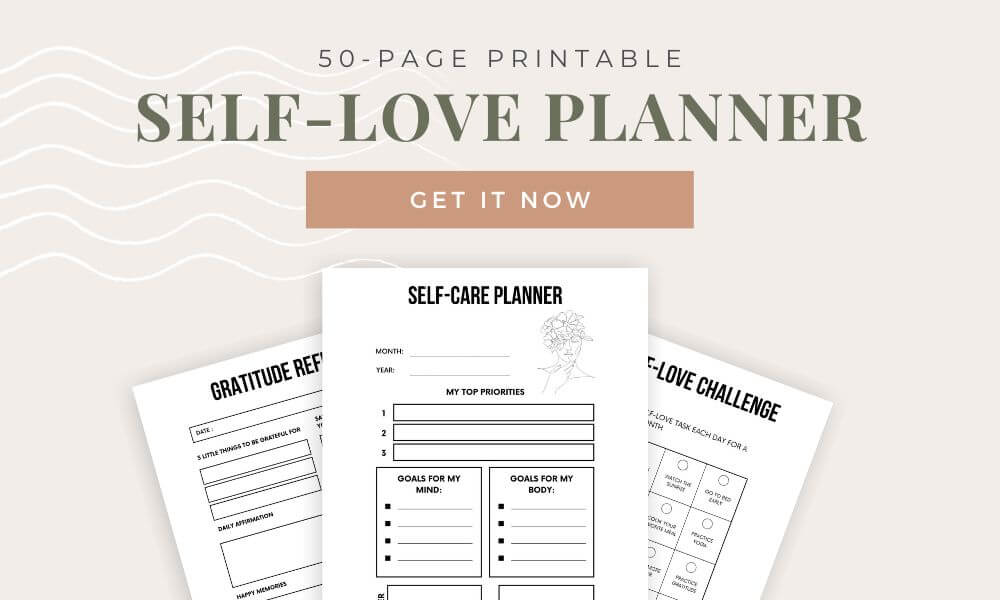
My Self-Love Journey
I’ve been on an epic self-love adventure since day one. It’s been a rollercoaster ride of discovery and growth, with exhilarating highs and some really super challenging lows.
Along the way, I’ve always had this burning desire to find inner contentment. My own self-love journey is a big reason why this blog exists! It was possibly a huge catalyst for following a career in psychology.
While it wasn’t always a big focus, finding that sort of contentment was always in the back of my mind.
But the real self-love journey for me kicked off when I was around 38.
Knowing that the big 40 was just around the corner was like a harsh reality! Could I really be ‘that old?’. When my parents were 40, they seemed ancient. Oh, how our reality changes!
I wanted to feel ‘fab at 40’ and that was when my self-love process hit a whole new level.
This for me meant reaching my best physical state – healthier than ever! Regular exercise, eating better, practising proper self-care and digging deep into my mental state to really know what lights my soul on fire.
And I can tell you, the whole process has been incredible! I did feel fab at 40. I was fitter than I had ever been. I even cut down drastically on sugar at 39. As a mega chocoholic, this is a thing I never thought I would be able to do.
All of it combined brought me to a much happier, healthier mental state – a more intentional life!
But have I finished my self-love journey? Heck no. It’s an ongoing process of loving ourselves and it’s a journey I plan to stay on for the rest of my life.
Eliminating Self-Love Blocks
The process of self-love is an ongoing journey that requires you to be mindful of how you think, feel, act, and care for yourself. Ultimately, self-love involves learning to appreciate yourself, including your body and your mind.
It’s also about embracing your flaws, setting boundaries, and listening to what your body and soul need. It’s a whole package deal, my friend.
But here’s the thing, loving yourself can be hard. Like trying to assemble IKEA furniture without the instructions hard.
Why? Well, blame it on society and the media . We’re bombarded with messages that we’re never good enough, never pretty enough, never [insert adjective] enough.
We’ve become experts at criticising ourselves.
When was the last time you gave yourself a compliment?
And when was the last time you criticized yourself?
Yeah, see my point?
But here’s the good news: starting your self-love journey is totally doable. You just need to take some action and also identify what might be getting in the way of loving yourself completely!
Here are some common self-love blocks that you may encounter:
Negative Self-Talk
Imagine having a little troll in your head, constantly whispering in your ear, saying things like, “You’re not good enough,” “You’re a failure,” or “You don’t deserve love.”
Ugh, talk about a party pooper!
But here’s the thing: that annoying voice is not your friend, and it’s definitely not telling you the truth.
Show that voice who’s boss. Challenge those negative thoughts and replace them with empowering affirmations or reframe them positively.
You have the power to rewrite that narrative in your head. Flip the script and let your inner cheerleader shine through. You are a rockstar, and don’t you dare let anyone, especially that troll, tell you otherwise.
Perfectionism
Perfectionism is another self-love roadblock that can prevent you from loving yourself fully. It is the belief that you must be perfect to be worthy of love and acceptance.
Perfectionism can lead to unrealistic expectations, which can cause stress and anxiety.
To overcome perfectionism, you need to learn to accept yourself as you are. Embrace your flaws and imperfections, and focus on progress rather than perfection.
Remember that nobody is perfect, and that is okay. Done is also better than perfect!
Comparison is the thief of joy ! It can make you feel inadequate and unworthy. It is the habit of comparing yourself to others and feeling like you do not measure up. Comparison can lead to feelings of jealousy, envy, and low self-esteem.
You might also refer to it as imposter syndrome.
This is definitely one that I feel often in my blogging journey. There are some complete and utter rockstars in the online space and I often feel like my introverted self will never quite compare. But, you know what, I’ve built some pretty amazing websites anyway – in my unique way!
To overcome comparison, you need to focus on your own journey and stop comparing yourself to others. Remember that everyone has their own unique path and that comparing yourself to others is unfair and unproductive.
You don’t know if you’re comparing your start to their middle. Or your worst day to their best day!
Instead, focus on your own progress and celebrate your achievements.
Fear of Failure
Fear of failure can prevent you from taking risks and pursuing your dreams.
It’s that nagging belief that failing is a catastrophe. But here’s the truth: it’s holding you back.
This fear leads to procrastination and inaction. To overcome it, reframe your mindset. See failure as a chance to grow and learn.
Every successful person has stumbled along the way. Embrace the lessons and the messy progress. Amazing things await beyond that fear!
Here are a few fun failure examples for you:
- Steve Jobs was fired from his own company at one point.
- J K Rowling was rejected dozens of times before finally getting Harry Potter published
- Oprah Winfrey was publicly fired from her first job as a TV reporter
These stories are prime examples of how you can most definitely fail forward.
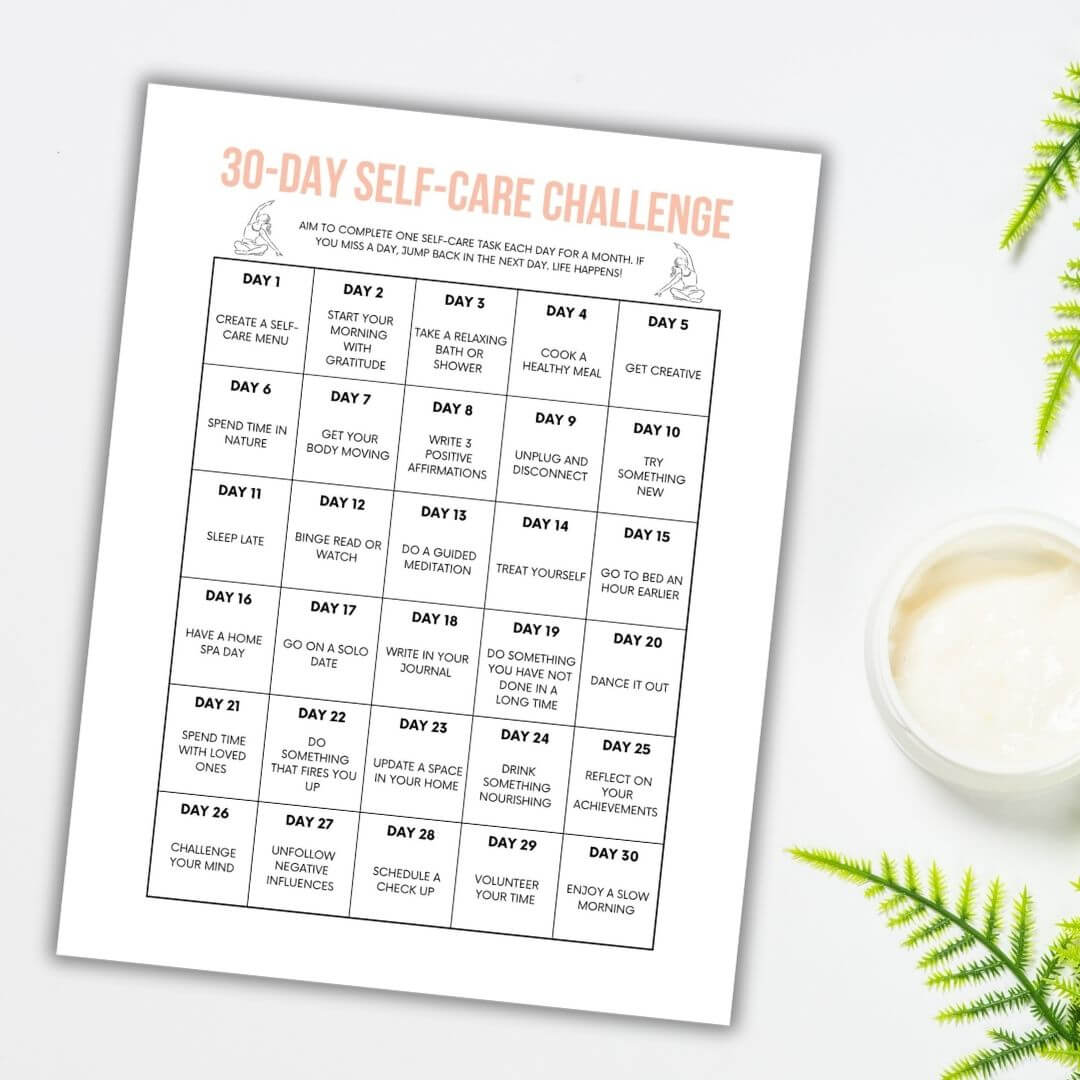
GET THIS IN MY FREE PRINTABLES LIBRARY!
How To Start A Self-Love Journey
Identifying and working on eliminating those dreaded self-love blocks are the first steps in your self-love journey.
Once you have developed a better understanding of yourself and where those blocks might be coming from, you can then kick off with the stuff that makes you feel loved and worthy!
Here are some actions to add to your self-love journey:
Goal setting is such an important tool in our lives! Personal, professional, physical… there are goals for every little aspect of our life!
Set goals that lead you towards the life you want to be living. Intentional goals help you lead an intentional life!
Setting yourself a goal for this journey is important too. It will help keep you accountable and motivated! Use these monthly goal-setting tips to help you.
Take Care Of Your Body
Eating healthy and exercising regularly can help boost your self-esteem . When you feel good on the inside, you will start to feel better on the outside.
When you know you are actively working towards a healthier you, nourishing your body with good food, and moving your body every day, you’re going to have that flow-on effect.
Exercise releases endorphins that make you feel good. Plenty of healthy foods also give you a positive mood boost.
And if one of your biggest self-love hurdles is body confidence, I can tell you from personal experience that while I still don’t love every part of my body, I sure do feel a heck of a lot better about it now that it is strong and fitter than it has been before!
Yeah, I’ve still got an annoying belly roll and I bloat horribly after I eat some foods, but this body is a strong body and it serves me well!
Care For Your Mind
A healthy body is key to feeling good, but a healthy mind is just as essential! After all, our emotional health plays a big part in our physical wellbeing.
Nourish your mind with things that bring your joy.
I love self-development and motivational podcasts and audiobooks to keep my mind inspired and excited. But journaling is equally useful for a healthy mind.
Take time to be open with your feelings and thoughts, reflect and dig deep with journal prompts to help you or self-love questions to help you process your feelings.
Try these 31 self-love journal prompts for a full month of guidance.
Do What Feels Good
Life is short. There is too much fun to be had to only spend our time focused on what we think we should be doing.
Spend time with people that make you feel good.
Find a hobby or activity that brings you true joy, like reading, painting, cooking, or pottery – anything that relaxes and engages your mind. Meditation can be a great tool to use too!
Practice Gratitude
Being grateful for what we have in our lives, for what we have achieved and what we are capable of doing is a huge part of loving ourselves!
Take a few moments each day to practice gratitude and count your blessings, no matter how big or small.
You don’t have to be thankful for everything in your life but you can take the time to appreciate those little moments that bring you joy.
I like to write down three things I’m grateful for each day and my kids also have a daily gratitude journal to start the habit early.

Be Kind To Yourself
Kindness starts with you! You hear that saying a lot but have you ever thought that it also means being kind to yourself? Because it does!
Self-compassion is essential to this journey. Don’t be too hard on yourself if you make mistakes, if things don’t go as planned or if your goals take a back seat for a while – we are only human!
Your self-love journey is all about taking the steps to build yourself up and nurture your own mind, body, and soul.
Self-kindness comes in many forms – practising daily self-care , treating ourselves to something special, positive self-talk & self-compassion.
Try New Things
When was the last time you felt really fired up about something? As in the good kind of fired up… not the cranky kind!
Trying new things can help you learn more about yourself and build confidence. It makes us more resilient and thus more capable of dealing with the curve balls that life throws our way.
Plus, you never know what hidden talents and interests you might have lurking in those unexplored areas!
Set Boundaries
Setting boundaries helps us to value ourselves and respect our own limits. Start by setting yourself small goals to practice this important skill.
Learning how to confidently say no will help in your self-love progress too!
Use Affirmations
While affirmations might not sound appealing to you, there is a lot of evidence to suggest that they can be effective in helping us to start believing in ourselves.
Pick an affirmation that resonates with you and practice saying it out loud every day until it starts to take shape in your life.
Or if that feels too woo for you, write a few favourite affirmations on post-it notes and put them in places that you will see them when you most need them.
Tip : Body love affirmations on the bathroom mirror are always a great starting point! Or self-care affirmations at your desk to remind you to take breaks.
Surround Yourself With People Who Lift You Up
Our environment can directly affect our mindset and attitude.
This means that if we are surrounded by people who drag us down, it is likely that our ability to love and appreciate ourselves will suffer.
We need to surround ourselves with positive energy from people who uplift us and ultimately believe in us. That could be friends or family members. But also consider the people you associate with at work.
While you can’t just ignore your toxic co-worker, you can minimise those interactions and make sure you’re using those boundaries to avoid letting them bring you down!
Have you ever felt more tense after watching a news report on tv? Or suddenly felt really down on your ability to maintain your home after seeing that Instagram mums with the perfect house and perfect life? Urgh!
Remove those triggers from your life.
Unfollow social media accounts that make you feel unworthy. Don’t read the glossy magazines with the perfect ‘air-brushed’ women. Don’t scroll Facebook with all the clickbait drama headlines.
Nah, spend your time consuming the stuff that feels good. Or better still, unplug entirely and be more present in your daily life rather than in what’s happening on your phone or tv.
So, there you have it! Starting a self-love journey is easier than you think!
Remember that there is no one-size-fits-all path to self-love. You have to find what works for you! So take your time, be kind to yourself, and enjoy the journey!
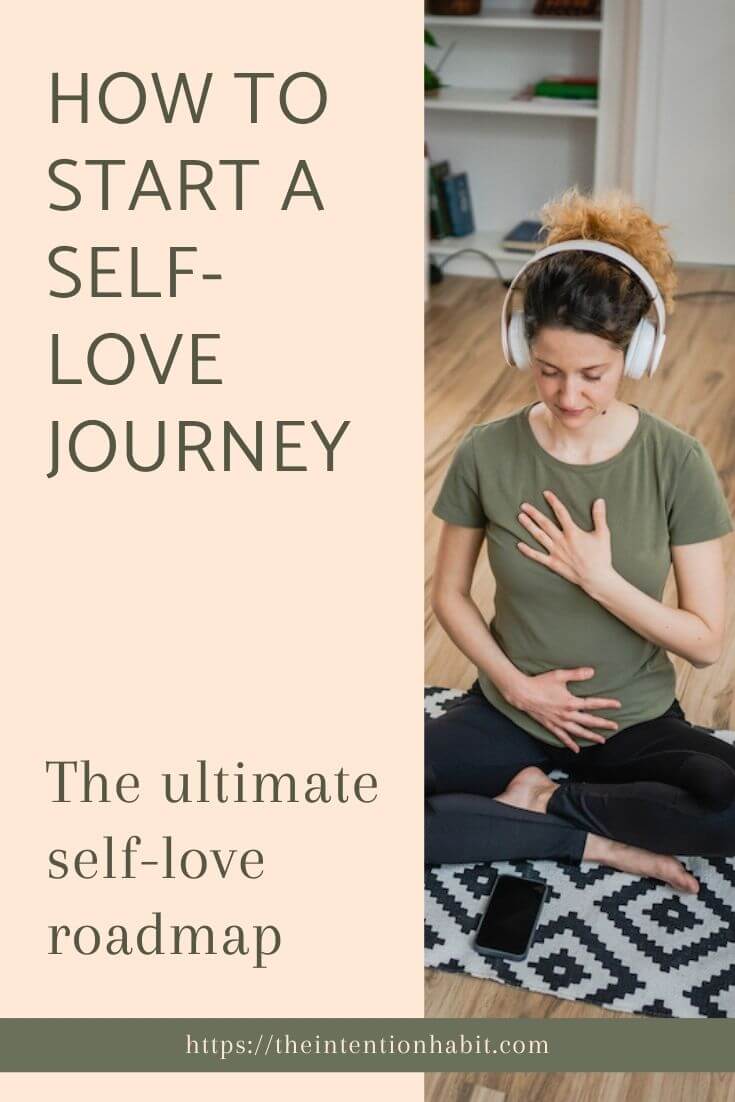
Holly is a mum of two with a passion for intentional living. Following a career in psychology, she now shares practical tips on creating a meaningful life and adapting a positive mindset.
Similar Posts

30 Self-Confidence Quotes for Women To Boost Your Self-Esteem Today
These self-confidence quotes for women are the inspiring words to empower a more confident and happier version of you! Because you deserve it!


30 Journal Prompts to Help You Find Your Purpose
Use these 30 deep journal prompts to find your purpose in life, to help you know your passions and plan an intentional and full life doing what matters.

125 Growth Mindset Affirmations To Inspire You
These growth mindset affirmations help us to embrace challenges, learn from failures, & continuously grow, ditching the fixed mindset holding us back.
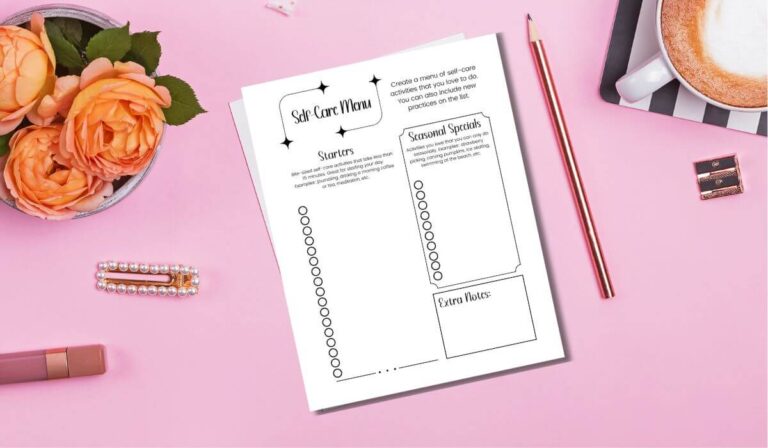
How To Create A Self-Care Menu + Free Printable Template
What’s on your personal self-care menu? We explore what a self-care menu is, how to create one and a sample self-care menu to help get you started.

100 Gratitude Affirmations To Feel Happier Every Day
Powerful positive affirmations for practising gratitude in your daily life.

30 Daily April Journal Prompts For Writing Motivation
These April journal prompts are the ideal way to keep you motivated for your daily journal habit as we enter into the fourth month of the year.

- Relationships
The Power of Self-Love
Why self-love matters, and how to get started..
Updated July 7, 2023 | Reviewed by Ray Parker
- Why Relationships Matter
- Find a therapist to strengthen relationships
- Self-love is accepting yourself wholeheartedly, treating yourself with kindness, and prioritizing your health.
- There are many ways to practice self-love—such as setting boundaries and celebrating your achievements.
- Self-love is a journey, not a destination—take time and practice to develop a healthy sense of self-worth.

Self-love has become a popular concept, but what does it mean to love yourself? And more importantly, how do we put it into practice? Let's explore the concept of self-love and how learning to love yourself can improve your mental health and well-being.
Defining Self-Love
Self-love entails accepting yourself wholeheartedly , treating yourself with kindness and respect, and prioritizing your physical and emotional health. It goes beyond mere actions and extends to your thoughts and feelings about yourself.
Loving yourself entails maintaining an overall positive outlook about who you are. This doesn't mean that you always feel positive about yourself, as that would be unrealistic. For instance, there may be moments when you feel upset, angry, or disappointed with yourself, and yet you can still love yourself—just as you can still love your child or partner despite occasionally being angry with them.
The Importance of Self-Love
Self-love lays the foundation for assertiveness , establishing boundaries , nurturing healthy relationships, practicing self-care, pursuing personal interests and goals , and feeling pride in one's identity. Without self-love, we’re prone to harsh self-criticism and may succumb to people-pleasing tendencies and perfectionism . We may tolerate mistreatment from others, disregard our own needs and feelings due to a lack of self-worth , and make choices that undermine our best interests.
Examples of Self-Love
The following examples may help you understand self-love better.
- Self-compassion: Treat yourself with kindness, understanding, and empathy, especially during challenging times. Acknowledge that you are human and deserving of love and forgiveness .
- Setting boundaries : Recognizing and asserting your needs, and communicating them clearly to others. Prioritize your well-being by saying "no" to things that drain your energy or compromise your values.
- Practicing self-care: Engaging in activities that nourish your physical, mental, and emotional well-being. This can include activities like exercising, practicing mindfulness or meditation , getting enough sleep, or enjoying a hobby.
- Celebrating your achievements: Acknowledging and celebrating your accomplishments, no matter how big or small. For example, treat yourself to something you enjoy, reflect on your growth, or share your successes with trusted friends or loved ones.
- Positive self-talk : Cultivating a positive inner dialogue and challenging negative self-talk. Replace self-critical thoughts with affirmations and reminders of your strengths, capabilities, and worthiness.
- Self-acceptance: Embracing your flaws, quirks, and imperfections. Recognize that you are unique and that your worth is not determined by external standards or comparisons to others.
- Seeking support: Recognizing when you need help and reaching out to trusted friends, family members, or professionals. Seeking support is an act of self-love that allows you to receive the care and guidance you deserve.
- Embracing self-discovery: Engaging in activities that help you better understand yourself, such as journaling, self-reflection, or therapy . Exploring your interests, values, and passions allows you to align your life with what truly brings you joy and fulfillment.
Differentiating Self-Love from Narcissism
One common barrier to embracing self-love is the fear that it might resemble narcissism or selfishness. When psychologists and therapists advocate for self-love, they aren't advocating for self-aggrandizement or superiority over others. Narcissists believe they are superior, refuse to acknowledge their flaws or take responsibility for their mistakes, and constantly seek external validation and recognition. They lack empathy for others.
In contrast, people who genuinely love themselves recognize their flaws, acknowledge their mistakes, and accept and care for themselves despite their imperfections. Self-love does not hinder caring for others; it merely allows individuals to extend the same kindness to themselves.
Other Barriers to Self-Love
Practicing self-love is hard for many of us. You may relate to some of these barriers:
- Perfectionism: "If I can't do it perfectly, there's no point in trying." This belief sets unrealistically high standards, making it difficult to accept oneself as imperfect and undermining self-love.
- Self-criticism: "I'm not good enough. I'll never measure up to others." Constantly comparing oneself to others and focusing on perceived shortcomings can create a negative self-image and a belief that one doesn’t deserve love.
- Guilt and self-sacrifice: "Taking care of myself is selfish. I should always put others' needs first." This belief prioritizes the needs of others to the point of neglecting personal well-being, leading to burnout and a lack of self-care.
- Fear of judgment: "What will others think of me if I prioritize my own needs?" The fear of being judged, or seen as selfish, can prevent individuals from engaging in self-love practices, as they may prioritize external validation over their well-being.
- Internalized negativity: "I don't deserve happiness or self-care. I'm not worthy of love." This deeply ingrained belief can stem from past experiences or negative messages received from others, leading to a lack of self-worth and difficulty practicing self-love.
Putting Self-Love into Action
It's normal to feel ambivalent about self-love or any kind of change. However, embracing self-love doesn't necessitate transforming every aspect of your life. Start by treating yourself a little better than you did yesterday.
To begin, identify one loving act you can undertake for yourself today. It could be a supportive thought or action. You can use the list in this post to help you generate ideas. Then, write down your chosen act and specify when you will accomplish it. By documenting it, you increase your accountability and likelihood of following through. As you incorporate more loving thoughts and actions into your daily life, they will gradually replace self-defeating thoughts and behaviors. With practice, self-love will become second nature.
©Sharon Martin. Adapted from a post originally published on the author's website.

Sharon Martin, DSW, LCSW, is a licensed psychotherapist practicing in San Jose, California.
- Find a Therapist
- Find a Treatment Center
- Find a Psychiatrist
- Find a Support Group
- Find Online Therapy
- United States
- Brooklyn, NY
- Chicago, IL
- Houston, TX
- Los Angeles, CA
- New York, NY
- Portland, OR
- San Diego, CA
- San Francisco, CA
- Seattle, WA
- Washington, DC
- Asperger's
- Bipolar Disorder
- Chronic Pain
- Eating Disorders
- Passive Aggression
- Personality
- Goal Setting
- Positive Psychology
- Stopping Smoking
- Low Sexual Desire
- Child Development
- Self Tests NEW
- Therapy Center
- Diagnosis Dictionary
- Types of Therapy

At any moment, someone’s aggravating behavior or our own bad luck can set us off on an emotional spiral that could derail our entire day. Here’s how we can face triggers with less reactivity and get on with our lives.
- Emotional Intelligence
- Gaslighting
- Affective Forecasting
- Neuroscience
Best 30 Day Self Love Challenge (+FREE Self-Love Worksheets PDF)
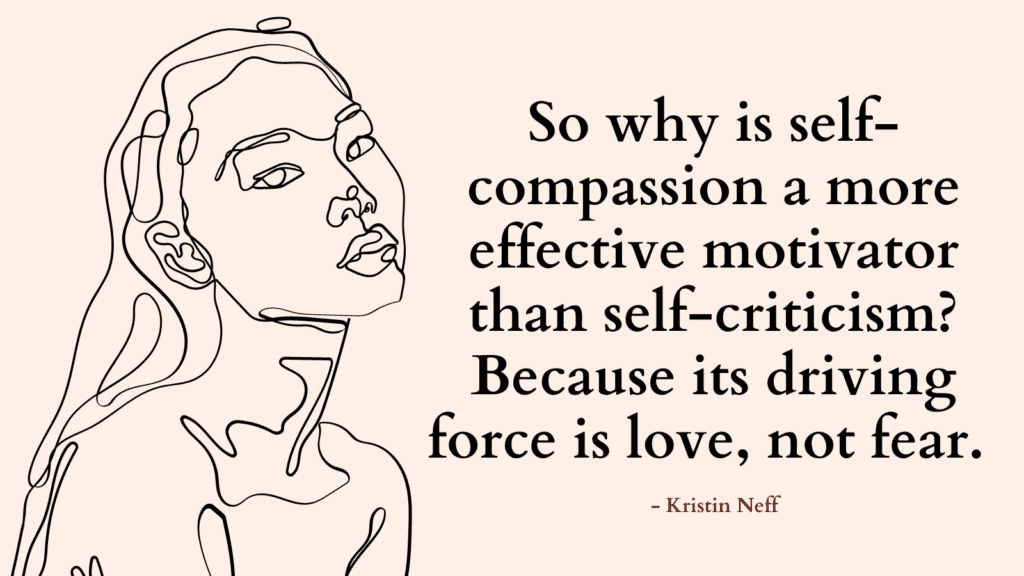
Here is a 30 day self love challenge that will change the way you feel about yourself and change your life in thirty days.
Self-love isn’t self indulgence.
It isn’t selfishness—in the negative interpretation of that word.
The goal here is to balance between taking care of yourself and tending to your true responsibilities to others without obsessively focusing on them or feeling overly responsible.
Self-love can mean “me first,” but usually, “me too.”
What Is Self-Love?
What self-love is not, 6 signs of lack of self-love, 30 day self love challenge to grow in self-love, free self-love worksheets pdf.
Self-love is critical to our happiness.
If we’re not used to it, it will take some practice.
To define self-love, we need to first explore what self-love is not.
Related: How To Start A Self Love Journey? Top 10 Powerful Ways to Love Yourself More
Self-love is different from self-absorption or narcissism.
People who are love themselves take care of themselves while being attentive to the feelings and needs of those around them.
If anything, being loving with ourselves helps us take better care of other people.
Self-absorption, on the other hand, keeps us stuck in our own world and makes no room for anything else.
Self-love is different from self-pity .
Self-pity is a form of self-absorption. We get caught up in our own problems and we become oblivious to the world around us.
Self-love, on the other hand, allows us to see our suffering as a shared human experience. Unlike self-pity, self-love affords a sense of proportion to our situation so that we can accept and deal with our pain in more constructive ways.
Self-love is different from self-gratification.
Self-gratification is an impulse to “treat ourselves,” even when it’s not in our best interest.
Oftentimes, the most loving thing we can do for ourselves may be to not buy something we don’t need, or eat something that’s not healthy.
Self-love is different from self-esteem .
Self-esteem is based on self-evaluation. It’s our way to relate to ourselves with understanding and acceptance.
While self-love is a gentle and caring attitude toward our own pain and needs. It may contribute to increased self-esteem, but it does not depend on it.
Related: How To Manifest Self Love? Best 9 Ways To Grow In Self-Love
Lack of self-love comes from being unable to accept or forgive our imperfect selves. The following are some signs you might lack self-love
- Staying in dysfunctional or abusive relationships because you don’t believe you deserve better;
- Feeling uncomfortable in your body;
- Starving yourself, binge eating, or hurting yourself to distract yourself from your real pain;
- Neglecting your basic needs for sleep, nutrition, and exercise;
- Overworking yourself because you don’t know how else to find validation;
- Lashing out or shutting down when feeling criticized because you are ready to believe anything bad about yourself.
What Self Love Sounds Like?
I try to be understanding and patient toward the aspects of my personality that I don’t like.
I give myself the caring and tenderness I need in hard times.
I try to remind myself that feelings of inadequacy are a shared human experience.
I see the difficulties as part of life that everyone goes through.
I try to approach my feelings with an attitude of curiosity and openness.
When I fail at something important to me I try to keep things in perspective.
Related: Top 23 Self Love Questions (+FREE Self-Love Resources)
Day 1 – Write Down Your Goals For The Year
Start with a list of goals for the year and turn them into smaller goals to achieve each month.
Ask yourself what you would like to have happened in your life this year. What good would you like to attract into your life? What would you like to accomplish? What blocks, or character defects, would you like to remove? What would you like to replace them with?
Write down your answers. there is a powerful force motivated by writing down goals.
This gives you a direct but is also an affirmation that you’re committed to fully living life in the year to come.
Day 2 – Define Your Values
Determine the ethics and ideals you want to live by – the code of conduct we want to follow.
For example, staying sober, honoring your commitment to yourself, being authentic, honesty, compassion, etc.
List of Values
Day 3 – set healthy boundaries.
Having and setting healthy boundaries is essential in every recovery process, especially growing in self-love.
Boundaries require you to let go of guilt and shame and to change your beliefs around what you think you deserve and what you should tolerate and what you shouldn’t.
The clearer your thinking about this becomes, the easier you find it to set healthy boundaries.
Setting healthy boundaries doesn’t mean pushing people away or trying to control them. It means that we’ve changed, that we mean what we say and this will make others take us seriously.
Think about your relationships with other people and think back to times when you felt hurt. For instance, you might have felt bad having to talk about a private matter because couldn’t say no. Do you think you should set a limit here?
What makes you angry? What have you had enough of? What doesn’t feel right? What can’t you stand? What makes you uncomfortable? What do you want? What don’t you want?
Related: How to Firmly Establish and Enforce Healthy Emotional Boundaries?
Day 4 – Know When To Compromise
Sometimes it’s better to give in to someone else’s wishes for the benefits of the relationship. But sometimes compromise is dangerous.
Notice when you’re tempted to compromise your standards in order to gain the approval or love of someone else. If it could lead to breaking your values, then maybe it’s not a good idea.
Day 5 – Stop Rescuing People
While there is nothing wrong with offering support and trying to solve someone else’s problem, if you’ve done everything you could and there’s nothing left for you to do but worry, then you need to let go.
Letting go doesn’t mean we don’t care. Letting go means we stop trying to do the impossible—controlling that which we cannot.
In your mind, repeat to yourself, “My job is done here, it’s up to them now. The ball is in their hands.”
Related: How to Heal Codependency and Savior Complex? Top 12 Strategies to Overcome Codependency For Good
Day 6 – Move When It’s Time
If you are unhappy with where you are, then there is no reason to stay there.
You may be learning hard lessons today, but don’t close off your ability to move and learn new lessons somewhere else.
Day 7 – Nurture Self Care
There isn’t a guidebook for taking care of yourself.
Ask yourself what do I need to do to take of myself today? And listen to that voice inside.
Related: Take Care of Yourself: (45 Simple Self-Care Practices for a Healthy Mind, Body & Soul)
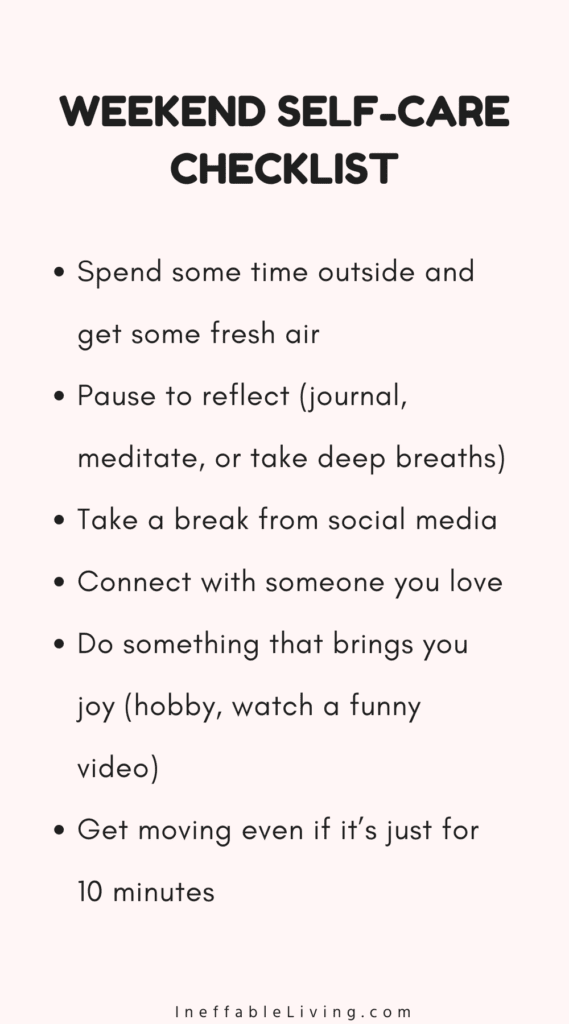
Day 8 – Say Yes to Yourself
Saying “yes” to someone is easy. It makes us feel good and accepted. The more we say yes, the more they ask of us and we mistakenly think this must be an expression of even more love.
Soon, we begin to feel bitter about our relationships. Can’t they do it themselves? Why am I the only one helping here?
This is when you need to start saying yes to yourself more. Balance your time and your energy with those around you. Make sure your wellbeing comes first.
Day 9 – Deal with Painful Feelings
Feelings of hurt or anger can be difficult to face. We can feel so vulnerable, out of control, and powerless when these feelings are triggered.
We may try to avoid these feelings by blaming people around us, or indulging in bad habits that will numb these feelings.
While avoidance might give us temporary feeling of relief, we’re in fact, only postponing facing our pain and maybe even reinforcing it.
The goal here isn’t to seek out hurt feelings or dwell unnecessarily on them, but rather to stop holding others responsible for your own pain, and to take responsibility for all your feelings by allowing yourself to feel them, learn from them, and let them go.
Real power comes from allowing yourself to be vulnerable enough to feel hurt and knowing that you can take care of yourself, even when you feel emotional pain.
Experiencing feelings can be a challenge if you had no previous experience or permission to do that before.
So take out your journal and write, “If it was okay to feel whatever I’m feeling without being judged as bad or wrong, what would I be feeling?”
Then write whatever comes to mind.
Related: 6 Simple Ways to Manage Difficult Emotions and Control Them
Day 10 – Accept Help
Some people have gone without love, used to having their needs rejected by their primary caretaker and might even feel shame for having needs at all.
As children they got the message that they are wrong for having feelings or needs and for wanting to be close – It’s difficult, maybe impossible, for a child to understand that it’s a problem that the parent has, rather than them.
But not reaching out for help comes at a great cost: you’re missing out on intimacy and connection with safe people. You’re missing out on all the richness of real relationships – love, kindness, and support.
It’s impossible to guarantee to yourself that you would always know who’s safe and who isn’t or that you won’t be hurt again.
This is when you need courage.
The courage to connect, and to risk. The courage to be yourself, and to be vulnerable.
And the courage to be compassionate towards yourself, and forgive yourself when you make a mistake.
Related: Learning How to Receive: (7 Steps to Opening Up And Unlock The Power of Receiving)

Day 11 – Stop Throwing The Blame Around
Blame is a healthy stage of grieving or letting go. But if you stay too long in this stage, blame becomes counterproductive, keeping you stuck and preventing you from taking effective action.
Blaming ourselves can turn into self-contempt; blaming others can turn into resentment and fuel the victim within.
If you’re going through a loss or disappointment, take your journal out and give yourself ten or twenty minutes to blame without censorship.
Once you get it all out, think about the things that you can do to change this situation and let go.
Day 12 – Take Responsibility for Yourself
Most people are good at taking responsibility for other people, but they never learn to take responsibility for the most important person in their lives – themselves.
You might instinctively feel responsible for the feelings, thoughts, choices, and problems of others – but never feel responsible for your own feelings, thoughts, choices, and problems.
You might believe, at an unconscious level, that others are responsible for your happiness, just as you are responsible for theirs – this is caretaking.
Caretaking doesn’t work. People end up feeling hurt and angry, you end up feeling used and victimized.
The most generous act you can perform is to take responsibility for yourself – for what you feel, think, want, need, and choose, and to trust that others can take responsibility for themselves.
Related: How To Get Over Yourself And Stop Feeling That The World Owes You Anything
Day 13 – Stand Up for Yourself
Many people find it easier to come to the defense of others and fight their battles, but they struggle to stand up for themselves and rally to their own behalf.
There are times when you can walk a loving, compassionate path, but there will also be times when you need to stand up for yourself – when you’re being used, victimized, lied to, manipulated, or otherwise violated.
Learn to identify when you are feeling victimized, and why you are feeling victimized. And learn to own your power.
Sometimes, the answer is to set boundaries and not act on the urge to rescue that person from logical consequences of his or her behavior, other times you need to fight for yourself and your own rights.
Day 14 – Protect Yourself From Negative Influences
Be aware of the negative influences in your life and make a choice to stay away, if not physically, at least emotionally.
Spend less time with negative people and start seeking positive influences. Find a support group of like-minded people, or a helpful and positive friend.
Day 15 – Nurture Your Relationships
A relationship isn’t the beginning of your life and shouldn’t become your life. A relationship is the continuation of your life.
You can only be happy in a relationship when you’re happy without one.
But self-love is not done apart from your relationships. Growing in self-love is done by learning to own y our power and to take care of yourself in relationships.
In your journey of growing in self-love, your goal is not only to acknowledge your power to take care of yourself in your relationships but to also learn to be intimate with people when possible.
Think about your relationships and ask yourself the following questions:
* Do I need to detach from someone who I’ve been trying to control?
* Is there someone I’ve been avoiding because I’m afraid to take care of myself with that person?
* Is there someone I need to reach out to, or show love? Do I need to make an amend?
Related: Am I Controlling In My Relationship Quiz
Day 16 – Overcome Fear
Fear can hold many of us back: fear of failure, fear of what others might think, fear of making a mistake, even fear of success.
You might find yourself refraining from taking action, until eventually life becomes limited.
You might find yourself thinking, “I can’t do it well enough!” or, “Look at what happened last time!” or, “What if . . .?”
This sort of statements usually reflects shame disguised as fear.
Remind yourself that doing your best is good enough. And that even your failures and mistakes may turn out to be important learning experiences that are necessary for an upcoming success.
Feel the fear, but do it anyway.
Related: How Do You Find Courage In The Face Of Fear? 9 Proven To Overcome Avoidance (& Live Fully)
Day 17 – Deal With Panic and Anxiety
Many people experience panic and anxiety attacks.
Remind yourself that this too shall pass, but also help yourself calm down by doing the following:
Breathe deeply. When we panic, our breath becomes shallow, which only feeds panic. By deliberately breathing slowly and deeply, we can change our panic reaction and actually calm down.
Don’t respond to your panic with more fear. The fearful thoughts we engage only feed our panic. By not reacting to these thoughts and simply responding with something like, “Yeah, whatever,” and shifting our focus, we allow panic to pass without feeding it.
If panic and anxiety are a continual problem, seek professional help.
Day 18 – Let Go of Guilt
Most of the time, the things you feel guilty about are not your issues.
Someone else would violate your boundaries, and when you challenge their behavior, the person gets angry and defensive and you feel guilty.
Guilt prevents us from setting the boundaries that would be not only in our best interests, but also in other people’s best interests.
Don’t allow yourself to be controlled by guilt.
You’re not crazy or wrong for setting boundaries and to insisting on appropriate treatment.
Day 19 – Accept Anger
Being grateful and positive, doesn’t mean you shouldn’t feel angry.
Anger is a healthy emotion.
We don’t need to seek it out or dwell in it, but we shouldn’t ignore it, either.
Growing in self-love means that you need to shamelessly feel all your feelings, including anger, but also to take responsibility for what you do when you feel angry.
Because if you don’t allow yourself to feel angry when you have to, you’ll end up feeling angry and hateful towards yourself.
Related: How To Manage Your Anger In Healthy, Effective Ways?
Anger Worksheets
Day 20 – allow yourself to feel good feelings.
When talking about facing our own feelings, we often focus on pain, fear, and anger. But there are other feelings available that you need to allow yourself to feel.
Many people feel guilty to allow themselves to feel good feelings like happiness, joy, peace, contentment, love, closeness, excitement, etc.
Some people are always waiting for the other shoe to drop and constantly sabotaging their good feelings.
It’s okay to let yourself feel pleasurable feelings without analyzing or worrying about the future and about what other people are feeling.
Day 21 – Acting As If
“Acting as if” can be a powerful tool to practice positivity when you don’t have enough motivation to act positively.
Making a conscious decision to “act as if” can help you shift your feelings easily and unstuck yourself.
One study conducted by Amy Cuddy, a researcher at Harvard University, revealed that High power poses increased testosterone by 20 percent and decreased cortisol (stress hormone) levels by 25 percent, which helps boost confidence and reduce stress.
The most well–known and versatile high power pose is “The Wonder Woman” pose where you simply stand tall with your chest out and your hands on your hips.
Day 22 – Express Gratitude
Every day we face challenges, interruptions, delays, and changes.
We often feel overwhelmed or are busy preparing for the next challenge, we can’t see the lessons in these experiences.
A powerful way to get yourself through the most stressful of times, is expressing gratitude. Learn to say thank you for these challenges, because only then are you going to be open to learn the lesson.
Start practicing gratitude by writing at least 5 things you’re grateful for everyday, until gratitude becomes a habit.
Gratitude Journaling Prompts
Day 23 – stay in the present moment.
One of the main reasons behind our worries and fear is constantly asking ourselves the question “What’s going to happen?”
Whether you ask this about our careers, relationships, recovery, it’s easy to tangle yourself up in worrisome and fearful thoughts
No one can or should predict the future. Worrying about what’s going to happen next prevents you from functioning effectively today.
The best contribution to your future is to stay present, do your best and assure yourself that what’s going to happen tomorrow will be for the best.
Clear our mind of the residue of yesterday and fears of tomorrow.
Now is the only time you possess. And it is enough.
Related: How To Meditate? A Beginner’s Guide To Meditation
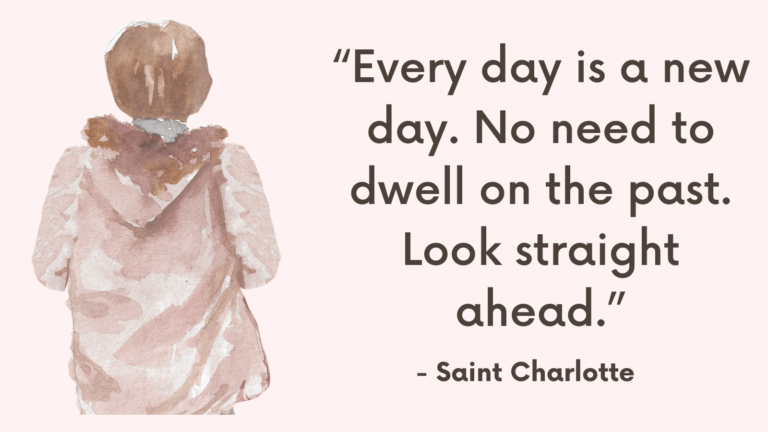
Why Do We Dissociate?
Start Reading Why Do We Dissociate?
Day 24 – Face Your Problems
Many of us avoid facing our problems. This denial became a way of life—our way of dealing with problems.
We often spend more time and energy reacting to a problem than we do to solving it. We miss the lesson – the point from having a problem.
A problem doesn’t mean life is horrible or that you’re a defective person.
Problems are our way to grow up as individuals and become mentally stronger.
Start facing your problems. Make sure the problem is yours, because if not, then maybe you should consider setting appropriate boundaries.
Seek the best solution. Sometimes this means setting a goal and taking an action, or asking for help, or gathering more information, or letting go.
Learn your lesson and trust your ability to solve any future problems.
Day 25 – Become Mentally Stronger
You don’t always have to be strong .
Sometimes, strength is expressed in being vulnerable, in allowing yourself to make mistakes, in allowing yourself to feel scared.
Sometimes strength is expressed in allowing yourself to cry in front of others, in opening up about your pain and hurt.
Part of loving yourself is to give yourself permission to “fall apart” when you need to.
Related: Building Mental Strength: 13 Things Mentally Strong People Don’t Do

Day 26 – Accept Imperfection
Why do we hurt ourselves by thinking that we’re inferior while believing that others are perfect?
The expectation of perfection whether from us or other people is never valid.
Expecting yourself to be perfect slows the process of growing in self-love – it put you in a guilty and anxious state.
Remind yourself that it’s okay to be who you are and that doing your best is good enough.
This doesn’t mean that we don’t have to learn from our mistakes or that we shouldn’t improve. It simply means that encouraging and approving of ourselves is the best way to help ourselves stay on track.
Start accepting who you are – accept your past, your limitation and your strengths, your physical self, as well as your mental, emotional, and spiritual self.
Try This: Self-forgiveness Practice
1. Think of a situation that you’re struggling to forgive yourself for.
2. If you could do it over, what would you do differently?
3. What can you say to your past self to offer compassion during that situation or experience?
4. Use this formula for your self-forgiveness affirmation or you can modify it as needed.
I accept that I’m human and I make mistakes.
I forgive myself for
I release myself from
5. Try writing an apology to yourself for being self-critical and harsh.
A quality apology includes three parts
(1) taking responsibility for our actions and their impact,
(2) expressing regret, and
(3) offering to fix things and make amends.
Related: Raising low self-esteem: 18 Ways to Build High Self-Esteem
Day 27 – See The Good In Yourself, Too
Most people find it difficult to see the attributes and beauty in themselves.
People mirror back our qualities, the negative and the positive ones. What you don’t like in others is probably what you don’t like in yourself. By the same token, the attributes and strengths you like in others mirror your own good qualities.
Choose three people in your life whom you admire and respect. Make a list of the qualities they have that you like most.
Now, ask yourself how many of these qualities you have, as well.
Day 28 – Negotiate Conflicts
Conflicts are part of relationships—with friends, family, loved ones, and at work.
It’s important to face these conflicts and solve problems in relationships or else both people will end up with unresolved feelings of anger and victimization that intensify the problem and waste time and energy.
Problem-solving and conflict negotiation skills are acquired and improve with time and practice.
Some problems can be worked out and worked through. Other times, the problem is a boundary issue we have, and there is no room to negotiate.
To resolve conflicts, we must be willing to identify the problem and what both people really want and need, let go of blame and shame, be flexible, and focus on possible creative solutions.
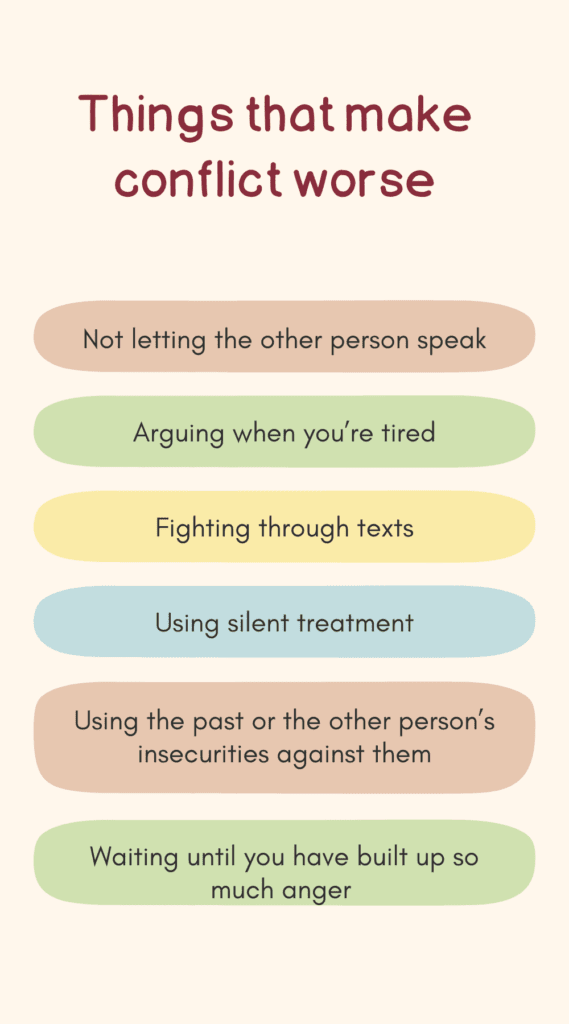
Day 29 – Give
Becoming a healthy giver can be a challenge.
Many of us got caught up in compulsive giving—usually motivated feelings of guilt, shame, obligation, or pity.
But compulsive giving don’t work. It backfires.
Knowing this, you might have stopped giving in order to focus on yourself and on growing in self-love.
However, healthy giving is part of growing in self-love.
The goal is balance giving that is motivated by a true desire to give, with an underlying attitude of respect for yourself and others.
The goal is to give, and not feel victimized by our giving – to choose what you want to give, to whom, why, and how much.
Ask yourself the following questions:
* Are you giving because we want to, or because you feel it’s your responsibility?
* Are you giving because you feel guilty, ashamed, or superior?
* Are we giving because you are afraid to say no?
* Are you giving so that people will like you? Are you giving to prove you are worthy?
* Are the ways you are trying to assist people helpful, or do they prevent others from facing their true responsibilities?
Growing in self-love includes a healthy cycle of giving and receiving. It might take time to learn how to give and receive in healthy ways. Be patient. Balance will come.
Day 30 – Find Balance
Loving yourself doesn’t mean going from one extreme to another – from taking care of everyone but ourselves to refusing to focus on anyone’s needs but our own.
The goal of growing in self-love is to find balance.
You can learn to give to others while taking responsibility for yourself.
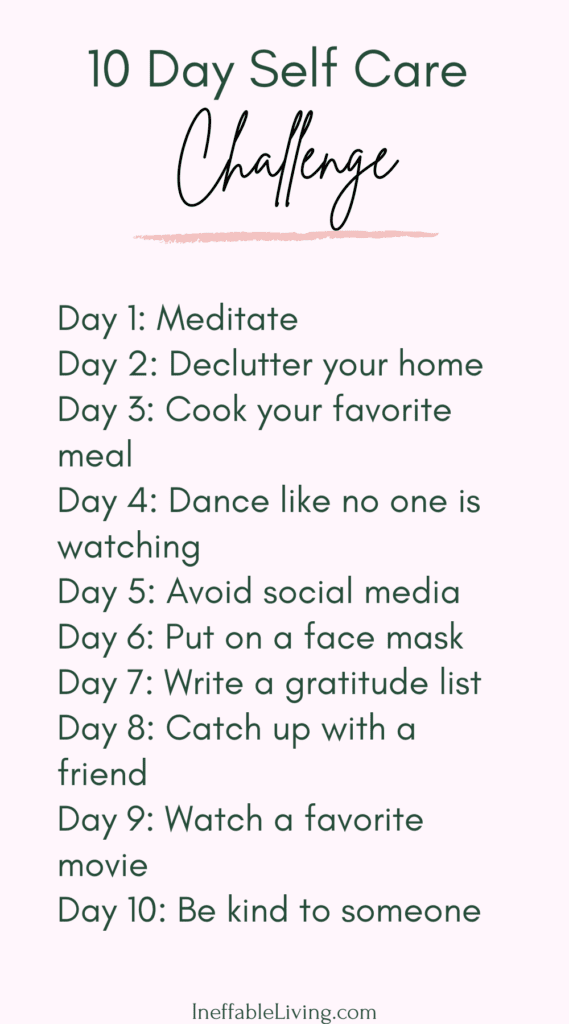
Self-love means being responsible for yourself while choosing to no longer be victims.
Self-love doesn’t lead to isolation and self-indulgence; rather it helps you better love others, and learn to let them love you.
Self-love isn’t selfish. It’s your way to love others.
Hadiah is a counselor who is passionate about supporting individuals on their journey towards mental well-being. Hadiah not only writes insightful articles on various mental health topics but also creates engaging and practical mental health worksheets.

Related Posts
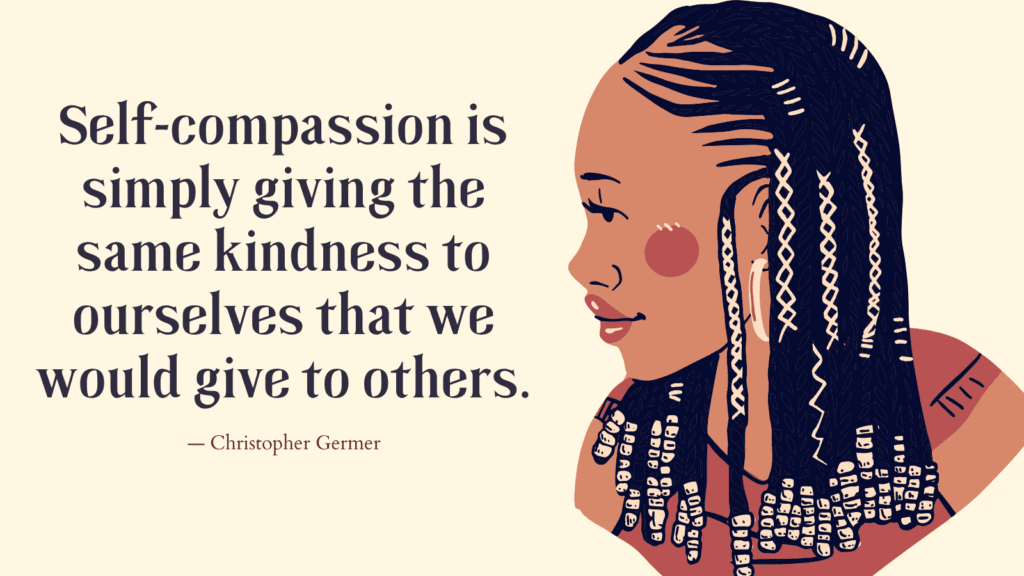
Best 11 Imposter Syndrome Exercises To Stop Feeling Like A Fraud (+FREE Worksheets)
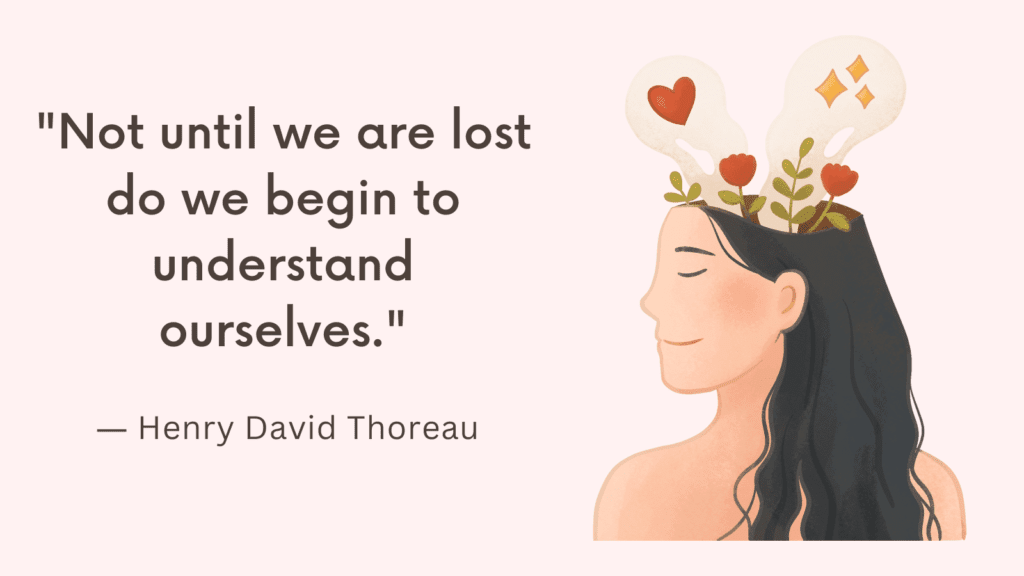
Am I Indecisive Quiz (& How To Overcome Indecisiveness & FOBO In 8 Powerful Steps)

IMAGES
VIDEO
COMMENTS
Loving yourself enables you to live in alignment with your values and to make healthy choices in your everyday decisions. Confidence, self-respect, self-worth, and self-love are all interconnected. As we deepen in love for ourselves, we can deepen the love we share with others.
Self love journey: what self-love is and what self-love isn't, and how to practice self-love... Self-love is a realistic, appreciative opinion of oneself. Self-love is about making space and prioritizing yourself. It allows you to embrace your life completely and wholeheartedly.
To become more self-compassionate yourself, try to follow these 7 steps: 1. Recognize that you are experiencing emotional distress or mental suffering. Adopt a mindful attitude in...
Self-love means that you have an appreciation, affinity, and positive regard for yourself. It’s closely related to self-esteem and self-compassion. When you have a strong sense of self-love, you understand your own value and treat yourself in a loving way.
Self-love comprises four aspects: self-awareness, self-worth, self-esteem and self-care. If one is missing, then you do not entirely have self-love.
The process of self-love is an ongoing journey that requires you to be mindful of how you think, feel, act, and care for yourself. Ultimately, self-love involves learning to appreciate yourself, including your body and your mind.
You’re about to learn how to practice self-love, but before we explore the many ways to do that, let’s get clear on what self-love is and why it’s so important. What Is Self-love? Self-love involves practicing self-compassion and giving yourself the nurturing care and kindness you deserve.
Honoring yourself is the first step in a lifelong journey to nurturing personal growth and learning to manage adversity. Self-love can be a challenge, but by prioritizing the practice, you’ll...
Self-love is a journey, not a destination—taking time and practice to develop a healthy sense of self-worth. Self-love has become a popular concept, but what does...
The goal here is to balance between taking care of yourself and tending to your true responsibilities to others without obsessively focusing on them or feeling overly responsible. Self-love can mean “me first,” but usually, “me too.” What Is Self-Love? What Self-Love Is Not. 6 Signs of Lack of Self-Love.